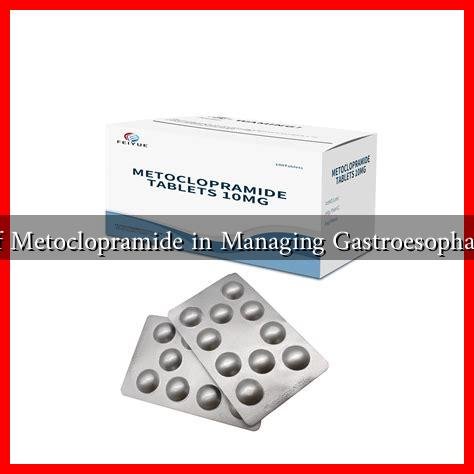-
Table of Contents
What Is the Role of Metoclopramide in Managing Gastroesophageal Reflux Disease
Gastroesophageal reflux disease (GERD) is a chronic condition characterized by the backflow of stomach contents into the esophagus, leading to symptoms such as heartburn, regurgitation, and difficulty swallowing. While lifestyle modifications and over-the-counter medications are often the first line of treatment, prescription medications like metoclopramide can play a significant role in managing GERD, particularly in patients who do not respond adequately to standard therapies. This article explores the role of metoclopramide in managing GERD, its mechanism of action, indications, and potential side effects.
Understanding Metoclopramide
Metoclopramide is a medication primarily used to treat nausea and vomiting, particularly in patients undergoing chemotherapy or surgery. It is also effective in promoting gastric emptying and enhancing esophageal motility. By increasing the tone of the lower esophageal sphincter (LES) and accelerating gastric emptying, metoclopramide can help reduce the frequency and severity of GERD symptoms.
Mechanism of Action
The effectiveness of metoclopramide in managing GERD can be attributed to its multifaceted mechanism of action:
- Increased LES Tone: Metoclopramide enhances the contraction of the LES, which helps prevent the backflow of stomach contents into the esophagus.
- Accelerated Gastric Emptying: By promoting gastric motility, metoclopramide reduces the time food spends in the stomach, thereby decreasing the likelihood of reflux.
- Antiemetic Properties: The drug’s ability to alleviate nausea can be beneficial for GERD patients who experience nausea as a symptom.
Indications for Use in GERD
Metoclopramide is not typically the first-line treatment for GERD but may be indicated in specific situations, including:
- Patients with Severe Symptoms: Those who experience significant discomfort and do not respond to proton pump inhibitors (PPIs) or H2-receptor antagonists may benefit from metoclopramide.
- Gastroparesis: Patients with delayed gastric emptying may find relief from GERD symptoms when metoclopramide is used to address both conditions.
- Short-term Management: Metoclopramide can be used as a short-term adjunct therapy while waiting for other medications to take effect.
Case Studies and Evidence
Several studies have examined the efficacy of metoclopramide in managing GERD. For instance, a randomized controlled trial published in the American Journal of Gastroenterology found that patients treated with metoclopramide experienced a significant reduction in GERD symptoms compared to those receiving a placebo. Another study indicated that metoclopramide improved esophageal motility in patients with GERD, leading to better symptom control.
Potential Side Effects
While metoclopramide can be effective, it is essential to consider its potential side effects, which may include:
- Drowsiness: Patients may experience sedation, which can affect daily activities.
- Extrapyramidal Symptoms: These include involuntary muscle movements and can occur, particularly with long-term use.
- Gastrointestinal Distress: Some patients may experience diarrhea or abdominal cramping.
Due to these side effects, metoclopramide is generally recommended for short-term use, and patients should be monitored closely by healthcare providers.
Conclusion
Metoclopramide serves as a valuable option in the management of gastroesophageal reflux disease, particularly for patients who do not respond to conventional treatments. Its ability to enhance lower esophageal sphincter tone and promote gastric emptying makes it a useful adjunct therapy in specific cases. However, healthcare providers must weigh the benefits against potential side effects and consider metoclopramide as part of a comprehensive treatment plan. As research continues to evolve, understanding the role of metoclopramide in GERD management will remain crucial for optimizing patient outcomes.


